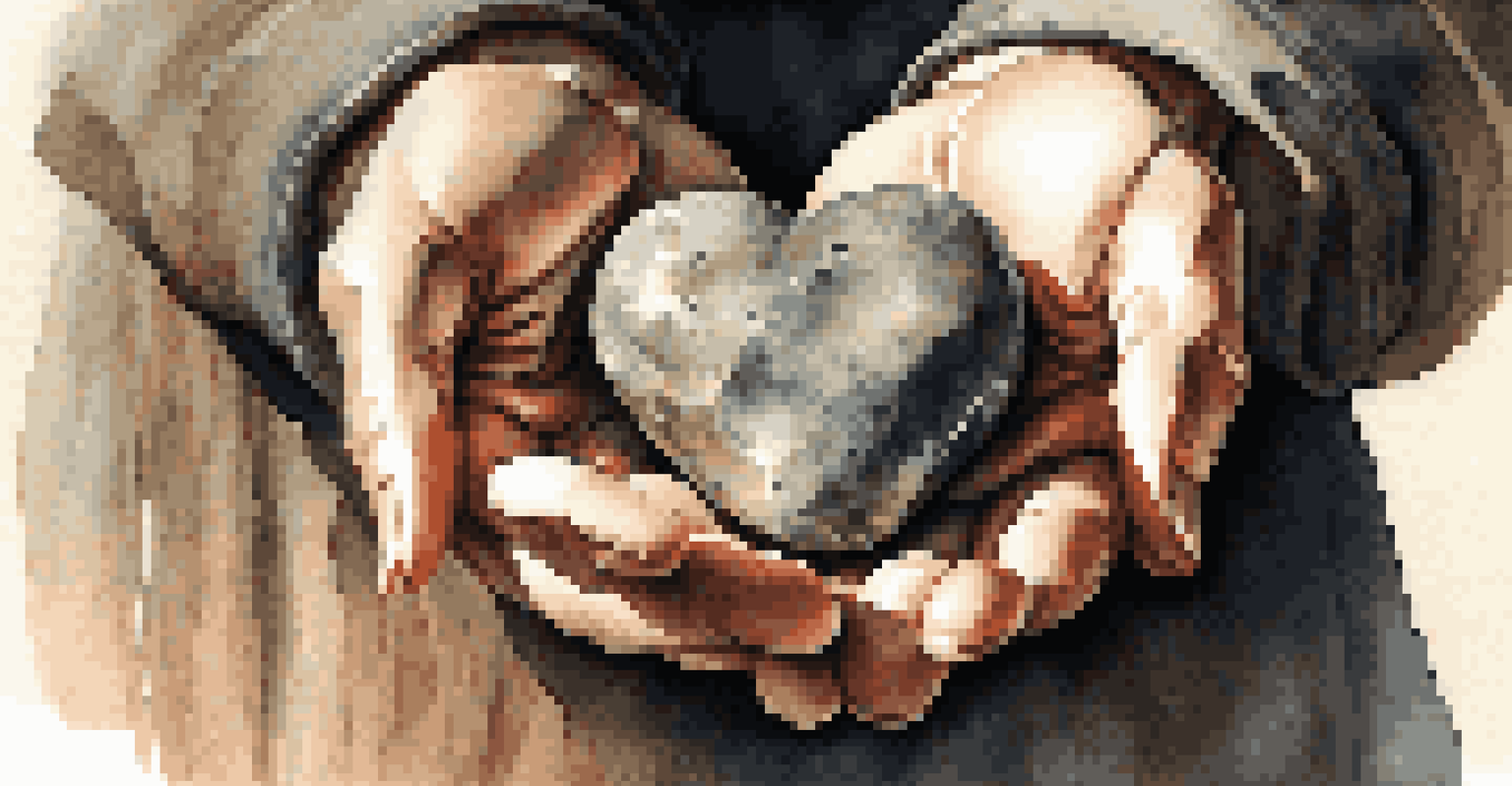The Role of Forgiveness in Maintaining Healthy Bonds

Understanding Forgiveness and Its Importance
Forgiveness often feels like a burden, but it's a crucial act for emotional health. It allows individuals to release anger and resentment, which can otherwise weigh heavy on the heart. This release isn't just about letting go; it's about making space for positive emotions and rebuilding trust with those we care about.
Forgiveness is not an occasional act, it is a constant attitude.
When we choose to forgive, we actively participate in healing both ourselves and our relationships. It’s important to remember that forgiveness doesn't mean condoning wrongdoing; rather, it’s a step towards personal freedom and peace. By understanding this, we can see how vital forgiveness is in maintaining healthy connections.
In essence, forgiveness serves as a bridge that reconnects us with others. It fosters understanding and empathy, enabling us to navigate through conflicts with grace. Ultimately, embracing forgiveness can lead to deeper, more meaningful relationships.
The Emotional Benefits of Forgiveness
Forgiveness isn't just beneficial for those we forgive; it's equally transformative for ourselves. When we hold onto grudges, we often find ourselves trapped in a cycle of negativity that affects our mental and emotional health. Letting go of these feelings can lead to reduced stress, anxiety, and even physical ailments.

By releasing past grievances, we open ourselves up to a future filled with joy and connection. The emotional weight we shed allows us to experience love and compassion more fully. This newfound emotional freedom can lead to improved self-esteem and a more positive outlook on life.
Forgiveness Boosts Emotional Health
Letting go of grudges leads to reduced stress and fosters emotional freedom.
Moreover, forgiving others often inspires them to reflect on their actions and consider making amends. This creates a ripple effect, encouraging a culture of kindness and understanding. In this way, forgiveness not only uplifts the individual but also strengthens communal bonds.
Forgiveness vs. Reconciliation: What's the Difference?
While forgiveness and reconciliation are often used interchangeably, they serve distinct purposes in relationships. Forgiveness is a personal decision to let go of resentment, while reconciliation involves restoring a relationship to its former state. It's essential to recognize that one can forgive without reconciling.
The weak can never forgive. Forgiveness is the attribute of the strong.
For instance, imagine a friend who repeatedly breaks your trust. You might choose to forgive them to alleviate your own emotional burden, yet decide that the relationship should remain distant. This distinction allows you to protect your well-being while still embodying compassion.
Understanding this difference can help set realistic expectations in relationships. Sometimes, forgiveness can pave the way for reconciliation, but it’s not always necessary or healthy to pursue. Prioritizing your emotional health is key, and recognizing these dynamics can foster growth in your connections.
The Role of Empathy in Forgiveness
Empathy plays a significant role in the process of forgiveness. By putting ourselves in someone else's shoes, we can better understand their actions and the circumstances that led to them. This understanding fosters compassion, making it easier to let go of negative feelings.
For example, if a loved one hurts us, reflecting on their struggles or stresses can humanize them and their actions. This doesn’t excuse their behavior, but it can create a deeper understanding of their perspective. Empathy allows us to see the bigger picture and helps ease feelings of anger.
Distinguish Forgiveness from Reconciliation
Forgiveness is personal and can occur without restoring a relationship.
Moreover, cultivating empathy within ourselves can enhance our relationships as a whole. When we practice understanding others, we're more likely to receive the same kindness in return. This creates an environment where forgiveness thrives and relationships can flourish.
Forgiveness as a Tool for Conflict Resolution
Conflict is a natural part of any relationship, but how we handle it can make all the difference. Forgiveness serves as a powerful tool in resolving disputes, allowing for open communication and understanding. By addressing the issue calmly and forgivingly, we can create a safe space for dialogue.
For instance, consider a disagreement with a partner. Instead of holding onto resentment, choosing to forgive can lead to a constructive conversation about feelings and needs. This approach not only resolves the conflict but also strengthens the bond between partners.
In this way, forgiveness acts as a catalyst for growth. It encourages us to engage with one another honestly and vulnerably, paving the way for healthier interactions in the future. When we approach conflicts with a forgiving heart, we cultivate resilience in our relationships.
Practicing Forgiveness in Daily Life
Incorporating forgiveness into our daily lives can seem daunting, but it starts with small, intentional steps. Reflecting on our feelings and acknowledging our pain is the first step toward letting go. Journaling about our experiences can provide clarity and help us process emotions effectively.
Another practical way to practice forgiveness is through mindful conversations. When faced with a conflict, try to express your feelings openly and listen to the other person's perspective. This dialogue can lead to mutual understanding, making forgiveness a natural outcome of the conversation.
Empathy Enhances Forgiveness
Understanding others' perspectives helps ease feelings of anger and promotes compassion.
Finally, remember that forgiveness is a journey, not a destination. It takes time and effort, but with practice, it becomes easier. By committing to this journey, we can foster healthier relationships and, ultimately, a happier life.
The Long-Term Impact of Forgiveness on Relationships
The benefits of forgiveness extend well beyond the initial act. By actively practicing forgiveness, relationships can evolve into spaces of trust, understanding, and connection. This proactive approach ensures that conflicts are addressed, not ignored, fostering resilience over time.
For instance, couples who prioritize forgiveness often report higher levels of satisfaction and intimacy. When partners feel safe to express their vulnerabilities, they create a nurturing environment that encourages growth and support. This leads to deeper emotional bonds and a more fulfilling relationship.

In the long run, embracing forgiveness can transform not only individual relationships but also our overall emotional landscape. It empowers us to approach life with an open heart, ready to face challenges while maintaining strong connections with those we love.